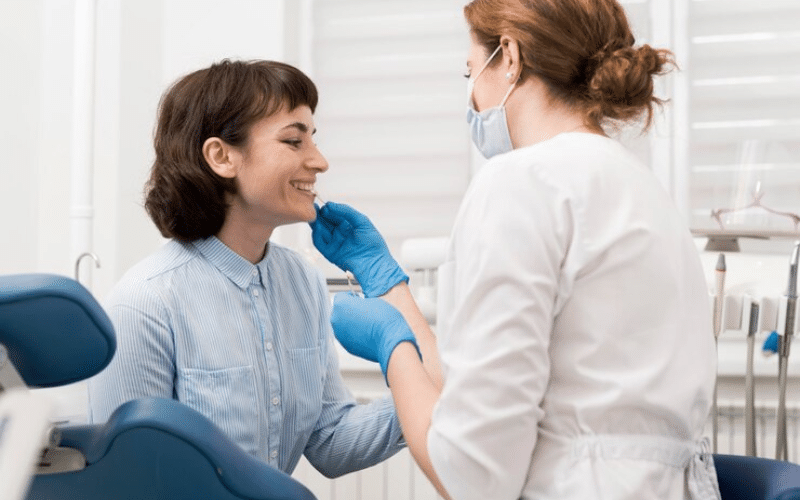
Detecting Danger: Learn How Oral Cancer Screenings Keep You Ahead
Oral cancer can be sneaky. It often shows no obvious signs in its early stages, which is why regular check-ups are essential to catch it before it becomes a bigger problem. Staying proactive and learning about the importance of oral cancer screenings can literally save lives. This blog dives into what oral cancer screenings are, why they’re vital, and how they keep you one step ahead of potential risks. Let’s jump right in!
What Are Oral Cancer Screenings?
Oral cancer screenings are quick, non-invasive exams that check for any signs of cancer or precancerous conditions in your mouth. During screening, your dentist carefully examines your lips, gums, tongue, and other oral tissues for any abnormalities. These exams are typically part of your routine dental visits, meaning you can stay ahead of any potential issues before they become serious.
Why Are Oral Cancer Screenings So Important?
Your mouth is like a window to your overall health, and changes in your oral tissues can signal deeper problems. Oral cancer can affect your lips, tongue, cheeks, and throat. The scary part? It often doesn’t show obvious symptoms in its early stages. However, by incorporating oral cancer screenings into your regular dental routine, you increase the chance of detecting any abnormalities early. Early detection means easier treatment and better survival rates, making it one of the most important steps you can take for your long-term health.
Signs You Should Look Out For
While oral cancer screenings are crucial, being aware of the warning signs can help you stay proactive between check-ups. Here are a few symptoms you should never ignore:
- Persistent sores or ulcers in the mouth that don’t heal
- Unexplained lumps or bumps in your mouth or neck
- Red or white patches inside your mouth
- Difficulty chewing, swallowing, or moving your jaw
- Unexplained bleeding or numbness in the mouth
If you notice any of these symptoms, don’t wait until your next screening—contact your dentist immediately for a check-up.
What Happens During an Oral Cancer Screening?
Screenings are quick, painless, and can be completed during a routine dental visit. Here’s what to expect:
- Visual Examination: Your dentist will look at your lips, gums, tongue, throat, and the inside of your cheeks for any abnormalities, such as red or white patches or unusual swelling.
- Physical Examination: Using their hands, your dentist will feel the tissue inside your mouth and along your neck for any lumps or irregularities.
- Additional Tools: In some cases, your dentist may use specialized lights or dyes to highlight any abnormal cells that might be hidden from the naked eye.
Who Needs Oral Cancer Screenings?
You might be wondering, “Do I really need an oral cancer screening if I’m young and healthy?” The answer is yes. While older adults and those with high-risk factors like smoking or excessive alcohol use are more prone to oral cancer, it can affect anyone at any age. Even if you’re a non-smoker and don’t drink, other factors, such as genetics or exposure to viruses, can still put you at risk. Oral cancer screenings are for everyone, not just those with higher risks.
How Often Should You Get Screened?
Getting screened at least once a year during your routine dental check-ups is ideal. For people with higher risk factors, such as smoking or excessive sun exposure, your dentist may recommend more frequent screenings. The key is to make screenings part of your regular dental routine so you can detect any problems early.
Preventing Oral Cancer
Aside from oral cancer screenings, you can also take steps to lower your risk of developing oral cancer. Here are some tips:
- Quit smoking: Smoking is a major risk factor for oral cancer. If you smoke, it’s never too late to quit.
- Limit alcohol: Excessive alcohol use increases your risk of oral cancer, especially when combined with smoking.
- Use sunscreen: Protect your lips from harmful UV rays by using lip balms with SPF.
- Maintain good oral hygiene: Keeping your mouth healthy through regular brushing, flossing, and dental visits can help prevent problems before they start.
- Healthy diet: A diet rich in fruits and vegetables is linked to a lower risk of oral cancer.
Prevention is always better than cure when it comes to your health. Oral cancer is a serious disease, but the good news is that it’s treatable if detected early. By making oral cancer screenings a part of your regular dental routine, you give yourself the best chance of staying healthy. Remember, your dentist is your first line of defense, so don’t skip those regular visits.No one likes to think about the “what-ifs,” but when it comes to your health, it’s better to be prepared. Regular oral cancer screenings can catch problems early, making treatment easier and more effective. Take control of your health by scheduling an appointment with a trusted dentist in Bellevue, PA, and ensure you’re staying ahead of the curve.


